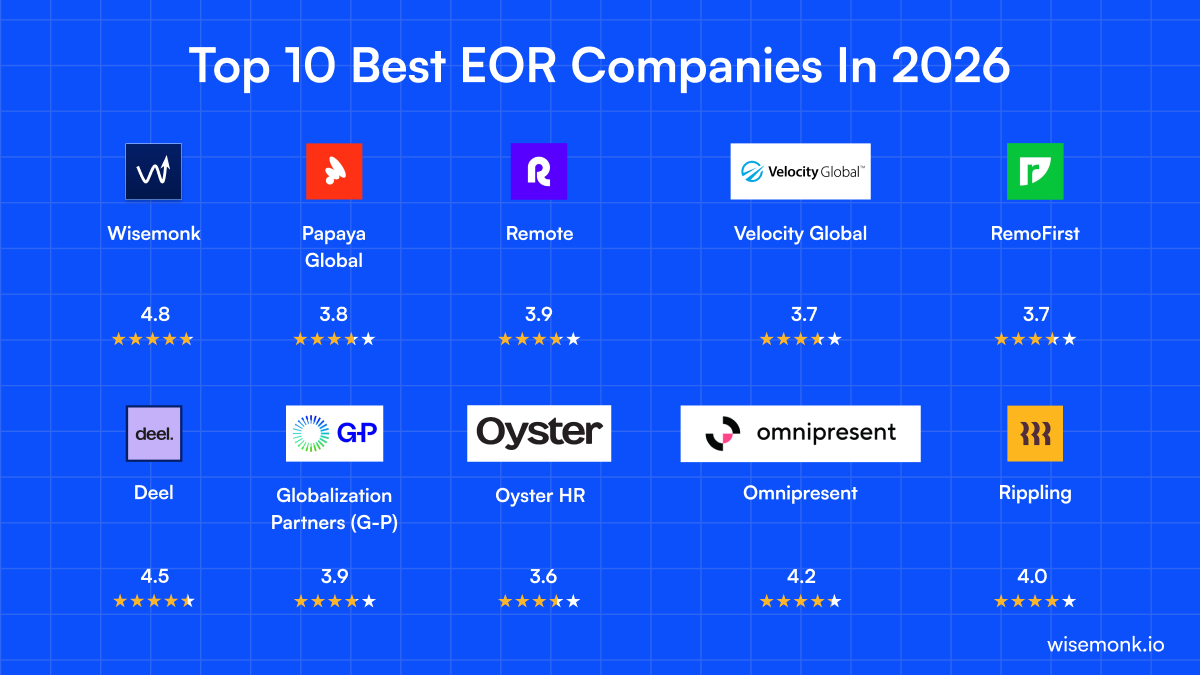Looking to expand into Central America without establishing your own entity? An Employer of Record (EOR) Costa Rica lets you hire employees and manage global payroll compliantly, without the complexity of local incorporation. In our experience, partnering with a professional employer organization for EOR services in Costa Rica lets companies scale quickly, navigate Costa Rican employment law effortlessly, and access the dynamic Costa Rican workforce without risking compliance with local labor regulations. Read on for everything you need to know about Costa Rica’s unique employment landscape and how an EOR in Costa Rica streamlines your global expansion.
What Is the Framework for Costa Rican Employment Law?[toc=Employment Law Framework]
When hiring in Costa Rica, understanding the local labor code is crucial to maintaining compliance and protecting your business.
- The Costa Rican Labor Code (Código de Trabajo) is the cornerstone of employment law, covering minimum wage rates, working hours, paid leave, sick leave, and written employment contracts.
- Employers must register all local employees with the social security system (CCSS) within eight days of hiring, guaranteeing timely social security contributions and health insurance for the entire workforce.
- Occupational Risk Insurance (INS) is required by law, providing coverage for workplace injuries and illnesses.
- Recent labor reforms address anti-discrimination, clarify employee rights, and streamline the process for resolving employment disputes.
- Complying with local labor regulations is essential for payroll taxes, benefits administration, and managing local employees without compliance risks.
- The Costa Rican employment relationship is governed by local regulations, and all indefinite employment contracts must adhere to minimum wage and termination notice periods as stipulated by Costa Rican law.
Staying informed about Costa Rican labor law helps ensure your business remains compliant and your employment contracts always reflect the latest legal standards.
What Are the Key Benefits of Using an Employer of Record in Costa Rica?[toc=Key Benefits of EOR]
Curious why so many international organizations are choosing an Employer of Record for their team expansion? Based on our experience guiding companies worldwide, these practical benefits make Costa Rica stand out:
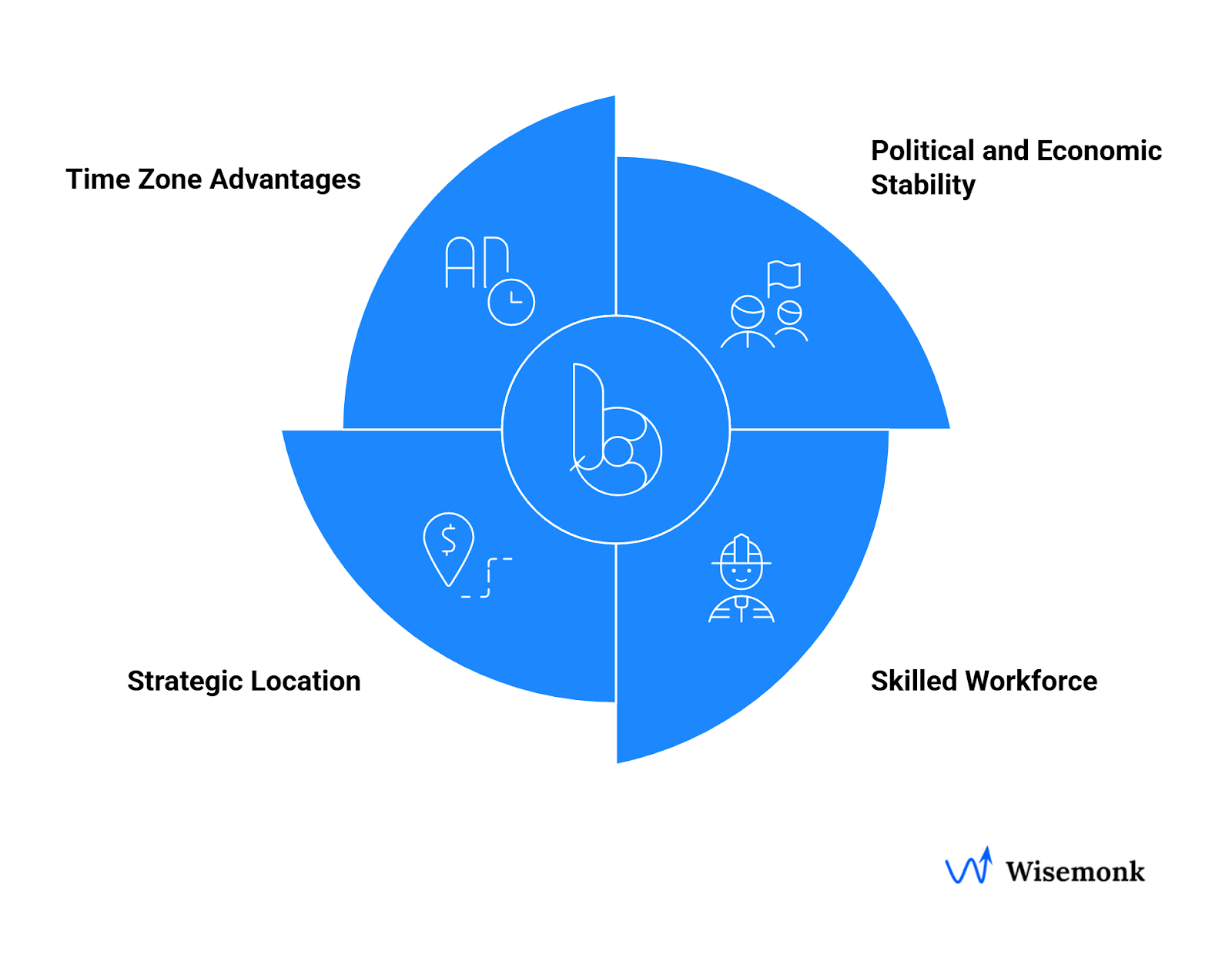
- Political and Economic Stability
Costa Rica enjoys decades of stable democracy and a robust legal framework, making it a safe environment for long-term investments and reducing compliance risks for foreign employers. - Skilled Workforce (Education Focus)
The country prioritizes education, resulting in a highly skilled local workforce with strong technical and language skills. This focus on human resources development is a significant advantage when you hire employees for specialized roles. - Strategic Location
Situated in Central America, Costa Rica offers proximity to major North and South American markets and serves as a gateway for companies looking to expand in the region. - Time Zone Advantages
Costa Rica’s Central Time Zone overlaps with key markets in the U.S., allowing for real-time coordination, faster response times, and smoother management of your Costa Rican workforce.
In our experience, these benefits, combined with streamlined payroll taxes, lower local costs, and full compliance with local labor regulations, make an employer of record EOR in Costa Rica a powerful solution for fast, compliant, and cost-effective market entry.
How Does Payroll and Tax Compliance Work in Costa Rica?[toc=Payroll & Tax Compliance]
Keeping up with Costa Rica’s payroll and tax rules is essential for compliance. Here’s what matters most:
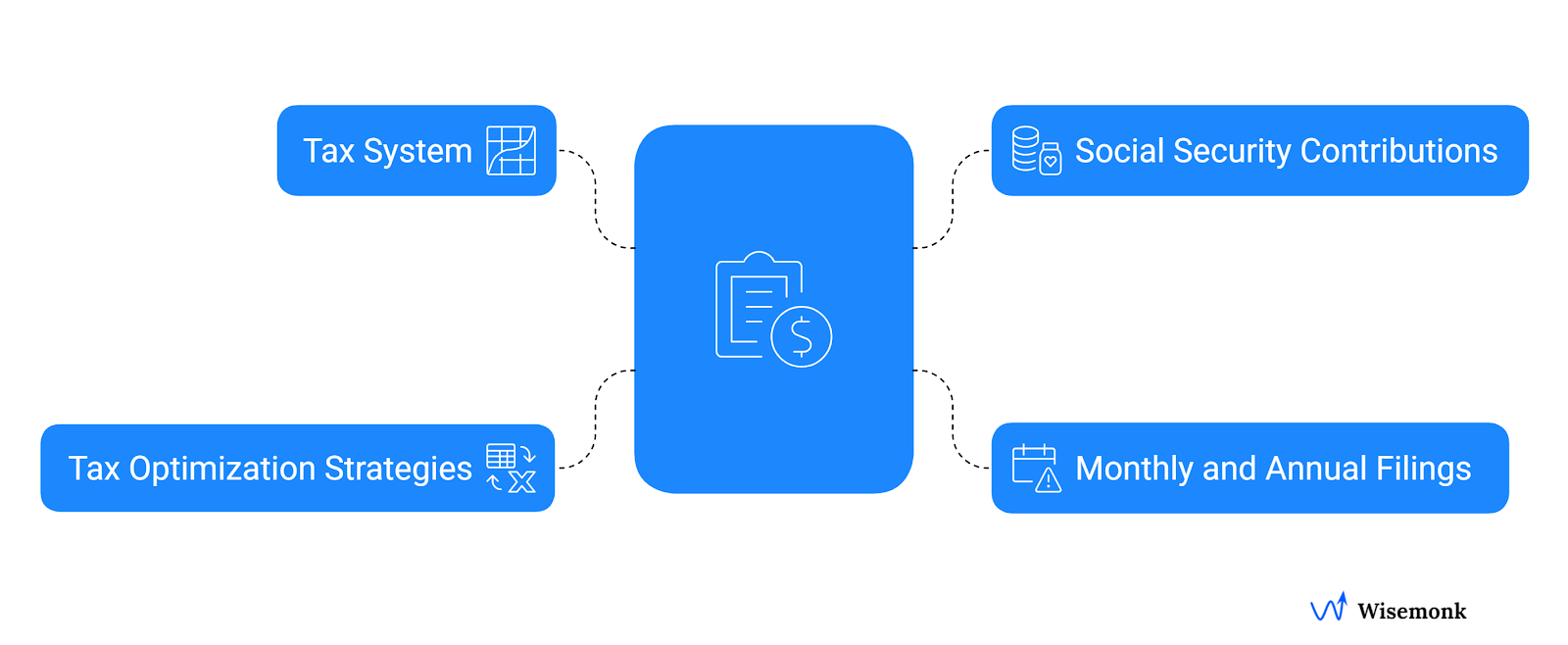
- Costa Rican Tax System: Costa Rica uses the territorial principle: only Costa Rica sourced income is taxed. For employees, income tax is progressive, ranging from 0% to 25% of gross salary. Employers must accurately withhold and remit this tax for their workforce.
- Social Security Contributions (CCSS): Employers must contribute 26.67% of gross salary, and employees 10.67%, every month to the CCSS. These payments fund health insurance, pensions, maternity, and other benefits.
- Monthly and Annual Filings: The tax year runs Jan 1–Dec 31. Employers must file and pay monthly payroll taxes by the 15th of the following month. Annual income tax returns are due by March 15 of the next year; penalties apply for late or incorrect filings.
- Tax Optimization Strategies: Keeping detailed payroll records and staying informed about new deductions or law changes helps optimize costs and avoid compliance risks. In our experience, regular reviews of social security and tax updates are key to smooth operations.
Accurate payroll, proper social security administration, and timely filings help every Employer of Record in Costa Rica stay compliant and avoid costly penalties.
What Employee Benefits and Entitlements Are Employees in Costa Rica Guaranteed?[toc=Employee Benefits]
Ensuring accurate employee benefits is essential for full local compliance. Here’s why getting these details right matters for your business success and legal security.
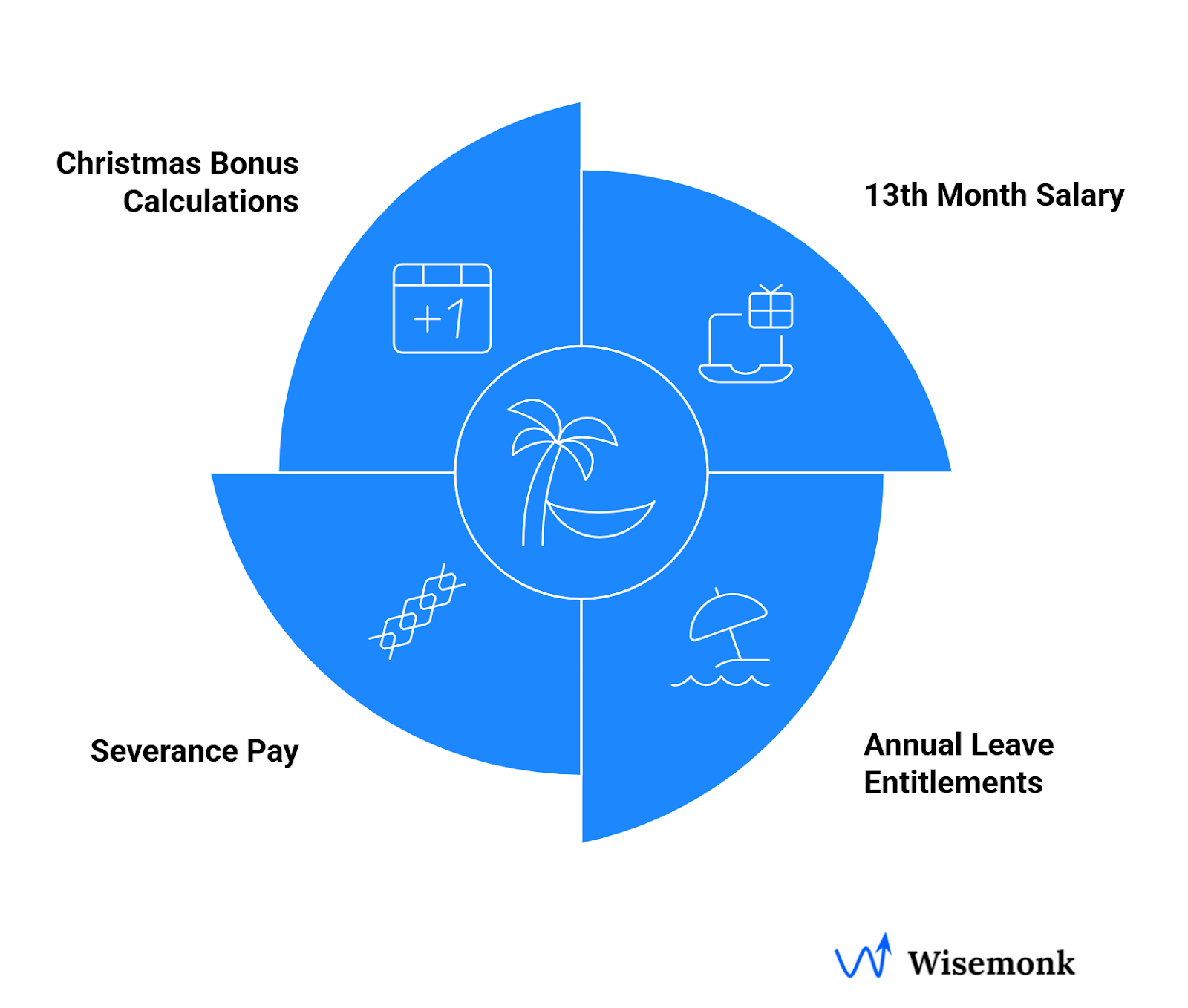
- 13th Month Salary (Aguinaldo):
Every employee receives a Christmas bonus (aguinaldo) equivalent to one month’s average salary, paid by December 20 each year. This benefit includes regular and variable wages and is mandatory under the Costa Rican labor code. - Annual Leave Entitlements:
Employees are entitled to at least two weeks of paid vacation after 50 weeks of service. Those with less than a year accrue one day of paid leave per month. Vacation pay must reflect the employee’s full gross salary. - Severance Pay (Cesantía):
Employees terminated without just cause are entitled to severance pay, which increases with years of service (capped at eight years). For three to six months of service, the minimum is one week’s pay, increasing up to 22 days per year for those with longer tenure. Severance is calculated based on the employee’s last monthly salary and is strictly regulated under the local labor code. - Christmas Bonus Calculations:
The bonus is calculated by totaling all salary payments (including overtime, commissions, and allowances) earned from December 1 of the previous year to November 30 of the current year, then dividing by 12. All local employees are entitled to this benefit, regardless of whether they work under indefinite employment contracts or fixed-term agreements.
Additional mandatory benefits include paid public holidays (with double pay if worked), paid sick leave (with a valid medical certificate after the third day), paid maternity leave for pregnant employees, and full social security contributions covering health insurance, disability, and pensions.
In our experience as a leading EOR service provider, adhering to these entitlements is essential not only for compliance but also for fostering a positive and sustainable employment relationship.
What Is the Hiring and Onboarding Process in Costa Rica?[toc=Hiring & Onboarding Process]
Hiring local employees in Costa Rica involves a straightforward yet regulated process that ensures compliance from day one.
- Required Documentation: Employers must collect a valid identification document (cédula), a medical certificate confirming the employee’s health, and social security registration. Additional documents may include proof of education and work history.
- Background Verification: Conducting thorough background checks, including criminal record verification and employment history, helps mitigate compliance risks when managing employees.
- Contract Requirements: Employment contracts must be written in Spanish and clearly specify terms of employment, salary, benefits, working hours, and termination conditions as per the Costa Rican labor code. Both indefinite and fixed-term contracts require compliance with local labor regulations.
- Integration Timeline: From documentation to onboarding, the process typically takes 2–4 weeks, depending on the complexity of the role and background checks. Using an employer of record Costa Rica often accelerates this timeline by handling administration and local expertise.
Ensuring proper documentation and clear contracts from the start builds a solid foundation for managing employees under Costa Rican employment law.
How Can You Effectively Manage a Costa Rican Workforce?[toc=Workforce Management]
Managing employees in Costa Rica means respecting local culture while applying people-centered practices. Here’s what matters most:
- Costa Rican Work Culture: Employees value community, collaboration, and respect for hierarchy. Team decisions are often made by consensus. The “Pura Vida” attitude emphasizes well-being, work-life balance, and a friendly environment.
- Communication Preferences: Costa Rican professionals prefer indirect, polite communication that fosters harmony. Feedback is given gently, and non-verbal cues like smiles are important. Building personal rapport usually comes before business discussions.
- Performance Management: Focus on regular, constructive feedback and collaborative goal-setting. Evaluations emphasize growth and team support over criticism. Leadership development and coaching are common.
- Professional Development: Continuous learning is a priority, with companies investing in training, language skills, and leadership programs. Structured career paths and mentorship align with national standards.
Respecting these cultural dynamics helps employers build engaged, high-performing teams while staying compliant with Costa Rican labor regulations.
What Are the Termination Procedures in Costa Rica?[toc=Termination Procedures]
Terminating an employee in Costa Rica requires strict adherence to local labor laws to avoid legal risks. Here’s a concise overview:
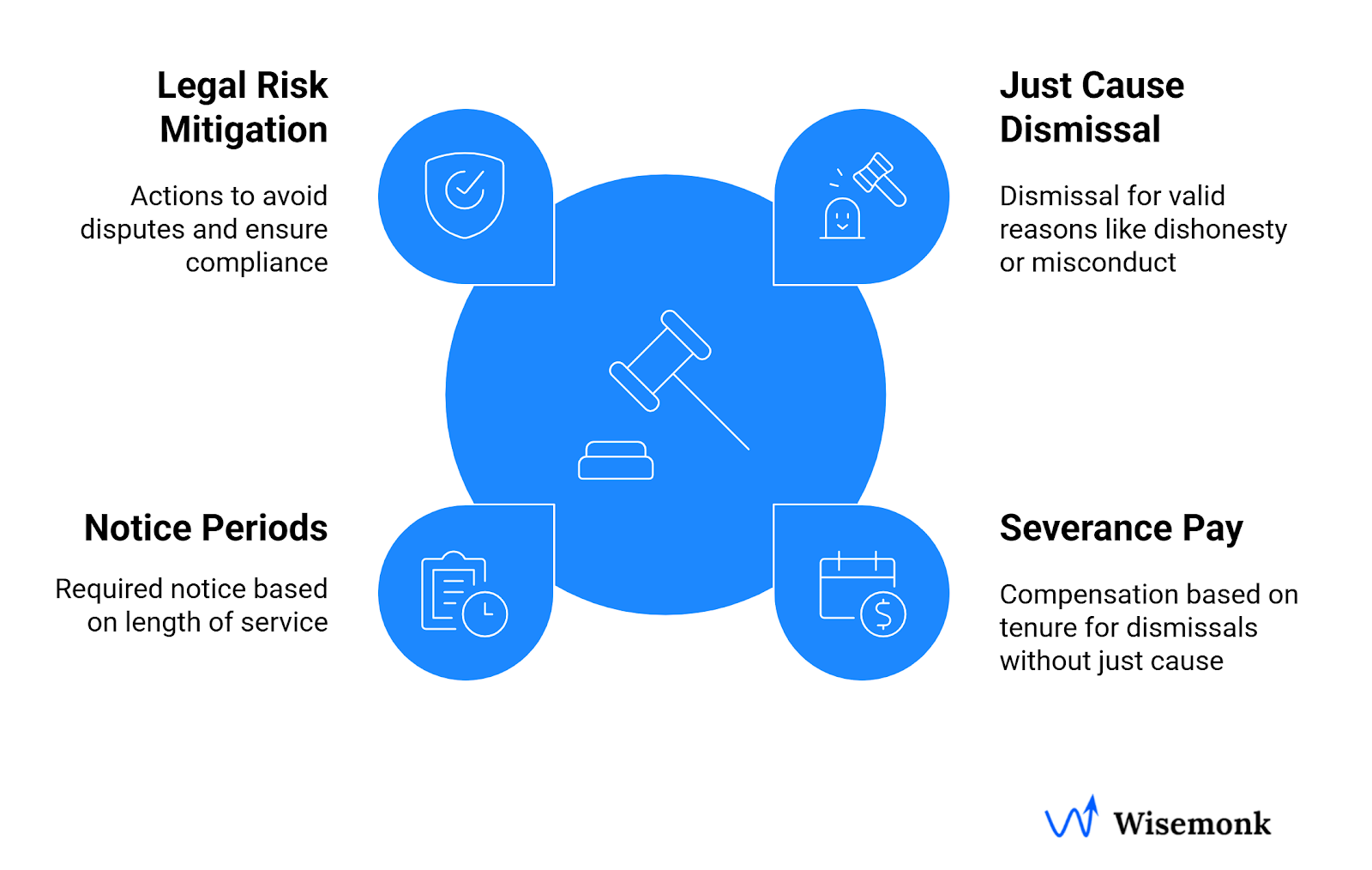
- Just Cause Dismissal:
Employers may dismiss employees for valid reasons like dishonesty, repeated misconduct, or contract breaches. Just cause must be well documented. In these cases, only accrued salary, unused vacation, and the Christmas bonus are due. - Severance Pay (Cesantía):
If dismissed without just cause, employees receive severance based on tenure, starting at one week’s pay for 3–6 months and increasing up to 20 days per year for longer service (capped at 8 years). It is calculated using the average salary of the last six months. - Notice Periods:
Notice depends on length of service:- 3–6 months: 1 week
- 6–12 months: 2 weeks
- Over 1 year: 1 month
Employers may pay instead of requiring the employee to work the notice.
- Legal Risk Mitigation:
Employers should document dismissals, clearly state just cause if applicable, and pay all due amounts promptly. Improper termination can lead to disputes, with Costa Rican law protecting employees strongly.
Following these steps ensures compliant and smooth employee terminations under the Costa Rican labor code and local labor regulations.
How Much Does an EOR Cost in Costa Rica and What Should You Plan For?[toc=Cost Analysis]
An Employer of Record(EOR) offers a straightforward, budget-friendly way to hire employees compliantly, without the heavy investment of forming your own entity.
- EOR Service Pricing Models:
Most EORs charge a monthly fee per employee, typically between $500 and $1,000, or a percentage of gross salary. Onboarding/setup fees often range from $1,000 to $3,000. Expect additional costs for extra administration, benefits, or compliance help, depending on your hiring needs. - Social Security Cost Implications:
Employers contribute 26.67% of gross salary and employees another 10.67% to social security, totaling a 37.34% payroll cost. This covers health insurance, pensions, and other statutory benefits. Costa Rica’s labor code requires these contributions for every employment relationship. - Benefits Budgeting:
You must budget for statutory entitlements including the 13th-month salary (aguinaldo), paid annual leave, severance pay, maternity leave, and public holidays. Many companies also offer extras like private health insurance to stay competitive while meeting all local labor regulations. - ROI Calculations:
Using an EOR lets you skip the high setup cost, lengthy registration, and ongoing admin required to run your own legal entity in a foreign country. For most teams, this saves money and dramatically reduces compliance risks, making it easier to scale up or down as business needs change.
Choosing a transparent EOR partner, planning for social security and benefits, and understanding all local cost factors is the best way to maximize your return and ensure success when hiring employees in Costa Rica.
What Are the Common Challenges and Solutions When Using an EOR in Costa Rica?[toc=Challenges]
Partnering with an employer of record Costa Rica eases hiring but comes with some common challenges and practical solutions:
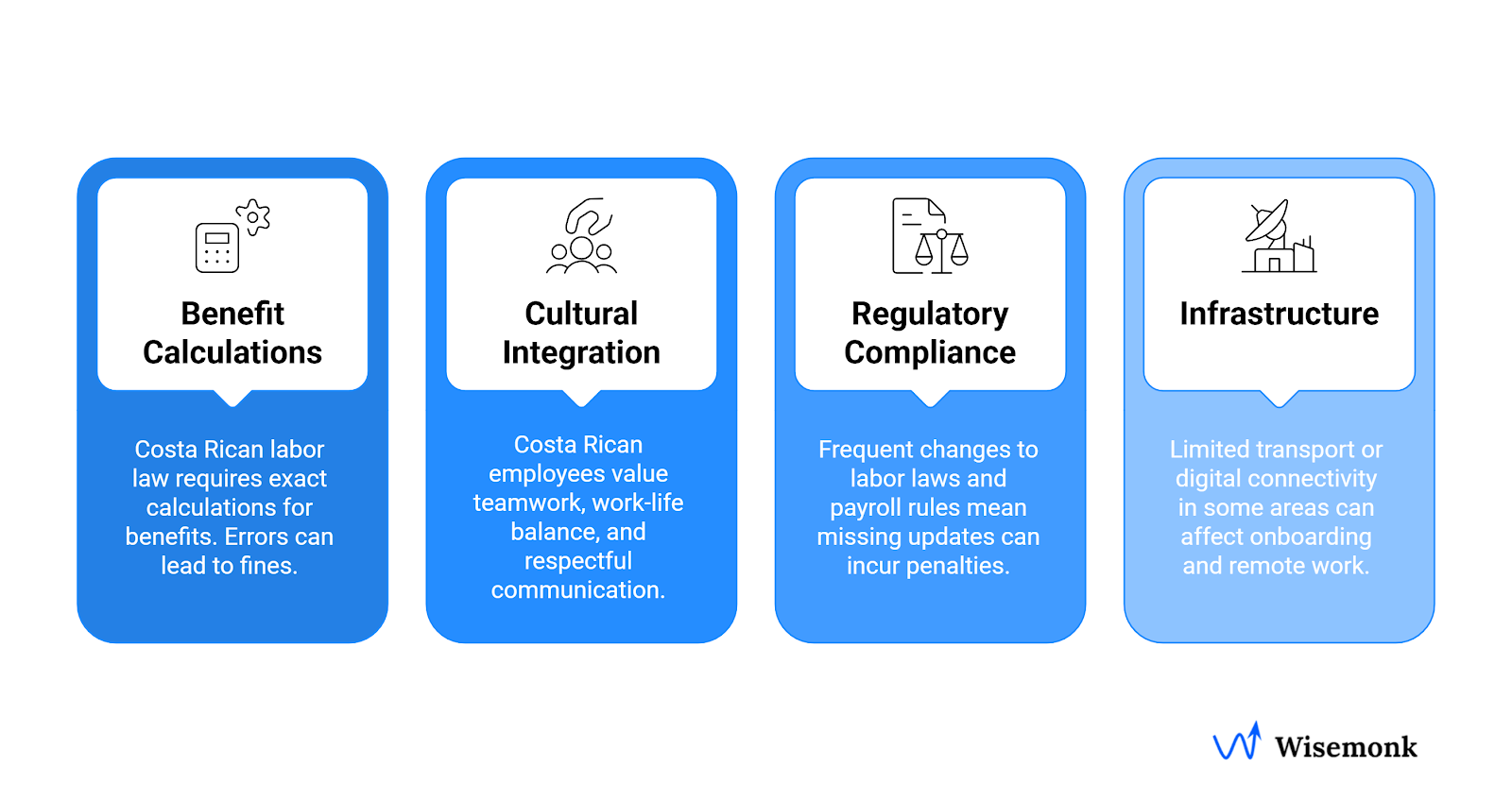
- Complex Benefit Calculations: Costa Rican labor law requires exact calculations for benefits like aguinaldo (13th salary), severance, overtime, and paid holidays. Errors can lead to fines. Use an EOR with local expertise and updated knowledge of labor law to ensure accuracy and compliance.
- Cultural Integration: Costa Rican employees value teamwork, work-life balance, and respectful communication. Provide cultural training, honor local holidays, encourage open communication, and focus on team-building to boost retention and performance.
- Regulatory Compliance: Frequent changes to labor laws and payroll rules mean missing updates can incur penalties. A reliable EOR monitors regulations continuously, ensures correct employee classification, and handles payroll on time to avoid risk.
- Infrastructure Considerations: Limited transport or digital connectivity in some areas can affect onboarding and remote work. Choose offices in urban centers with strong infrastructure or invest in hybrid work technology, guided by your EOR partner.
Proactive planning and partnering with knowledgeable local experts help companies navigate these challenges smoothly, keeping their Costa Rican workforce engaged, compliant, and productive.
Conclusion[toc=Conclusion]
Succeeding with an Employer of Record in Costa Rica depends on thoughtful provider selection, diligent compliance, and a clear local strategy. Work with an EOR experienced in Costa Rican employment law, social security contributions, and benefits administration to guarantee you meet all legal requirements and avoid costly compliance risks. Success hinges on strict adherence to the local labor code, proactive updates on evolving regulations, clear written employment contracts tailored to Costa Rican standards, and a genuine respect for the country’s work culture.
The most effective roadmap includes:
- Defining your Costa Rican market hiring needs.
- Selecting a reputable EOR with robust local expertise and a track record of compliance.
- Preparing compliant contracts in Spanish and registering staff with the CCSS social security system.
- Completing onboarding and required tax filings efficiently.
- Managing payroll, benefits, and attendance in line with the law.
- Maintaining ongoing legal compliance and strong communication with your EOR partner.
Companies that follow this approach enjoy reduced administrative burden, swift market entry, and ongoing success when hiring through an employer of record, making their expansion smooth, efficient, and fully compliant.
Ready to expand your global workforce quickly and compliantly? Partner with Wisemonk’s Employer of Record services to effortlessly manage hiring, payroll, and compliance, so you can focus on growing your business with confidence.
Frequently asked questions
What is the aguinaldo in Costa Rica?
The aguinaldo is a legally required Christmas bonus equal to one month’s average salary, paid to all employees by December 20 each year.
How are severance payments calculated?
Severance pay is based on the employee’s average salary over the last six months, multiplied by years of service (up to eight years), with specific days of pay assigned per year as detailed in the labor code.
What are the work permit requirements?
To get a work permit, employees must provide documents such as a completed application, passport copies, proof of financial means, a criminal background check, employer’s legal proof, and register with the social security system; permits often take months to process.
How does the social security system work?
All employees and employers contribute to the Caja Costarricense de Seguro Social (CCSS), which funds national health care, pensions, and disability insurance; coverage is generally mandatory and universal for workers.
What are the advantages of Costa Rica for nearshoring?
Costa Rica offers a skilled workforce, time zone alignment with North America, political stability, strong tech infrastructure, and competitive labor costs, making it a top choice for nearshoring.
What is the Employer of Record in Costa Rica?
An Employer of Record (EOR) in Costa Rica is a third-party company that legally hires and manages employees on behalf of another business, handling payroll, taxes, and compliance with local labor laws.
What is an Employer of Record for international employees?
An EOR for international employees allows companies to hire and manage staff in other countries without setting up a local entity, ensuring payroll, tax, and legal compliance globally.
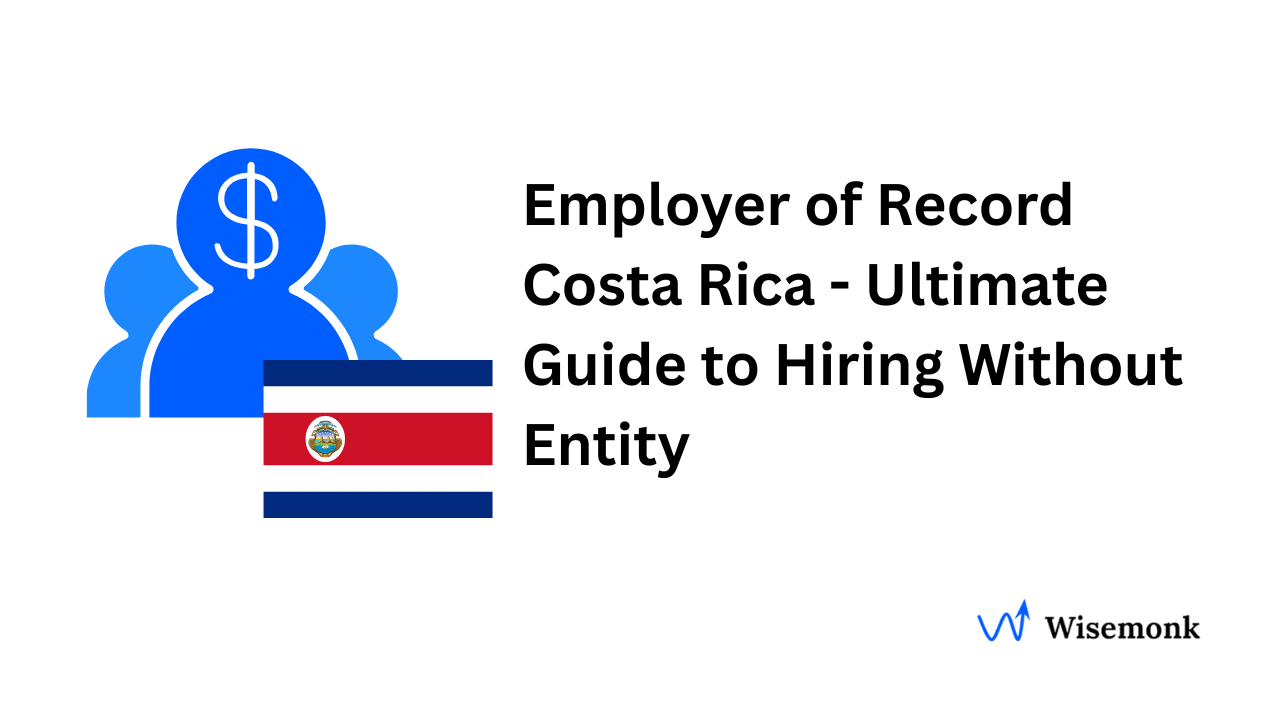
.png)
%20(1).webp)
